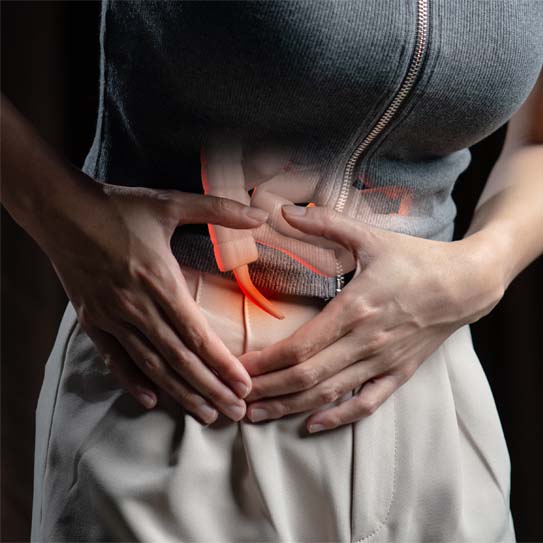
Palakkad
USFDA-Approved Procedure
Support in Insurance Claim
No-Cost EMI
1-day Hospitalization


Appendicitis Surgery in Palakkad
You may not think about appendicitis immediately as the symptoms like constipation or diarrhea, and vomiting can be caused by a number of reasons. Even heartburn may be one of the symptoms. If the medication for heartburn or gas does not help and you experience pain in the lower abdomen or lower back, it is time to seek medical help. Diagnosing appendicitis can be sensitive as the symptoms are similar to intestinal infection, Crohn’s disease, gallbladder problem, or urinary tract infection. Still, there is some clinical diagnosis that includes:
Sometimes antibiotics can treat infection in the appendix, but due to the busy schedule, patients usually prefer quick surgical treatment. Appendicitis is a medical emergency situation that must be treated within a few hours before it gets burst. There are two surgical approaches, open and laparoscopic appendectomies.
In an open appendectomy, the surgeon removes the appendix by making a large incision in the abdomen. The appendix is removed and the wound is cleaned and closed with stitches. This is the most preferred procedure for those who have already gone through abdominal surgery or those who have a perforated appendix.
In laparoscopic appendectomy, the surgeon makes 2-3 small incisions in the abdomen. During the procedure, the abdomen is inflated with carbon dioxide so that the surgeon can clearly see inside. A thin tube-like instrument with a camera attached on top of it so that the surgeon gets a view inside the abdomen. Other surgical instruments are inserted through the rest of the incisions. The appendix is removed and the incisions are closed using surgical glue.
For adults and obese people, laparoscopic appendicitis surgery is the best treatment. There are several advantages of laparoscopic surgery over open surgery:
Best Appendicitis Clinics
At Pristyn Care, we leverage advanced laparoscopic and traditional techniques to remove the appendix entirely. The treatment is minimally invasive and the damage to other organs and structures is negligible, along with high success rates.
Our expert doctors have 10+ years of experience in performing appendectomy or appendix removal surgery safely. The doctor compiles a personalized treatment plan for each patient.
Pristyn Care team and doctors will stay in touch with you to provide ample support and proper care after surgery. We provide free follow-up consultations to all the patients to ensure they have a smooth recovery.
We accept all health insurance to cover the appendix removal surgery cost. No-Cost EMI service is also available for all patients to divide the entire treatment cost into easy installments.
If you have signs and symptoms indicative of an appendix, you can initially consult with a primary healthcare provider or a general physician. But you experience an increase in the pain near the belly button or if you start vomiting suddenly, it is best if you consult a laparoscopic surgeon who is an appendix specialist. You can consult some of the best appendix doctors at Pristyn Care.
All the appendicitis specialists working at Pristyn Care-associated hospitals prefer to treat an appendix, in both regular and emergency conditions, through laparoscopic surgery. In this procedure, the surgeon makes tiny incisions and inserts a laparoscope. Using the device, the surgeon removes the defective appendix and seals the incisions.
There are basically two types of appendicitis.
Yes. Chronic appendicitis can be treated with the help of antibiotic medicines, such as ampicillin, tramadol, diclofenac, ceftriaxone, etc. These medicines will treat the infection and reduce inflammation that will provide you temporary relief. However, there will still be chances of recurrence and advancement of chronic appendicitis into acute appendicitis.
You should see a doctor for appendicitis if you have severe abdominal pain. Also, make sure that you hurry up and get properly diagnosed to prevent complications.
Laparoscopic surgery for appendix removal or laparoscopic appendectomy is performed under general anesthesia, which means that the patient would be asleep while the surgery is performed. In laparoscopic surgery for appendix removal, a laparoscopic surgeon makes 2-3 small incisions near the belly button and inserts a port which creates an opening and fills the abdomen with gas. Since the abdomen is inflated with gas, the surgeon gets space to perform the surgery well. The surgeon then inserts a laparoscope that has a tiny camera attached to it inside the abdomen. The camera guides the surgeon to view inside the abdomen, which the surgeon can see on a monitor. The surgeon locates the appendix and removes it through one of the incisions.
The results of a laparoscopic appendectomy may vary from one person to another depending on several factors. But, in general, this procedure is considered to be the safest of all forms of surgical treatment for the removal of an appendix. Benefits of laparoscopic surgical removal of appendix include:
There are three easy ways to book an appointment with the best doctor to get rid of painful symptoms of appendicitis:
Open appendectomy is the traditional approach that is performed through an incision of about 5cm or 2 inches on the right side of the lower abdominal wall. Laparoscopic appendectomy is a modern procedure that is performed through multiple small-sized incisions, each of about 1 cm or 1/2 inch.
While open appendix surgery is highly invasive, laparoscopic appendix surgery is minimally invasive and has the following advantages over the traditional approach.
Open and laparoscopic appendectomy has several risks and complications. But it is up to the surgeon to choose the best technique for the patient. In most cases, a patient prefers to undergo laparoscopic appendix removal surgery. However, in some cases, especially when the appendix is infected, the doctor may have to use the open surgical technique to carry out the procedure safely.
Whether you’ve had open appendicitis surgery or laparoscopic surgery, you will have to follow the doctor’s instructions to take care of the wound and overall health. You will have to follow the tips below:
Generally, there is no assured way to prevent appendicitis from occurring except for diet control. By choosing the right food and a balanced diet, you will be able to keep your digestive tract healthy and prevent the appendix from becoming inflamed.
Foods You Should Eat:
All foods that are rich in fiber help to prevent appendicitis. These foods include:
Foods You Should Avoid:
Here are the food items that can increase your risk of appendicitis:
.svg)
.svg)
.svg)